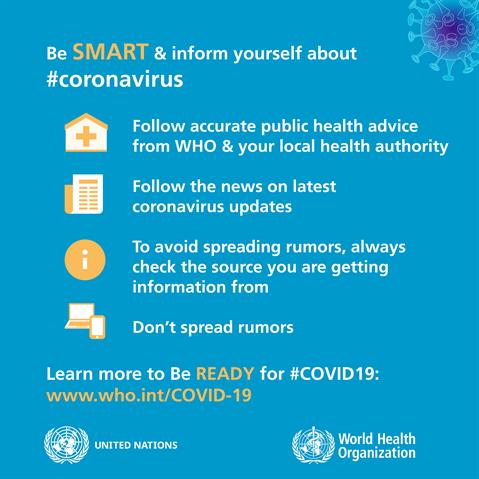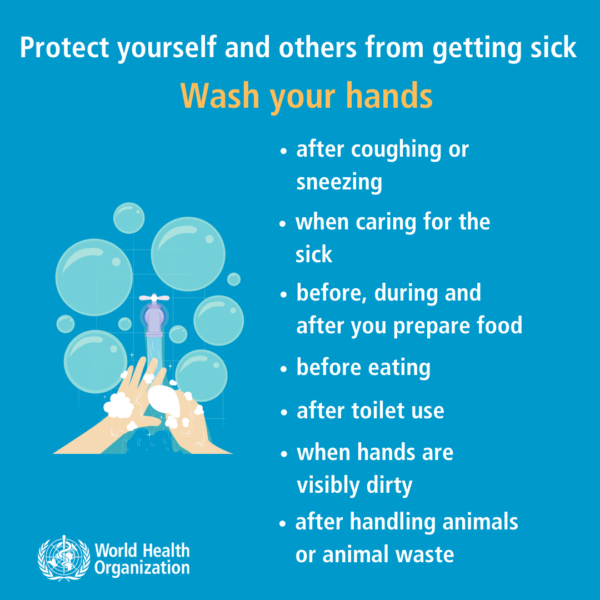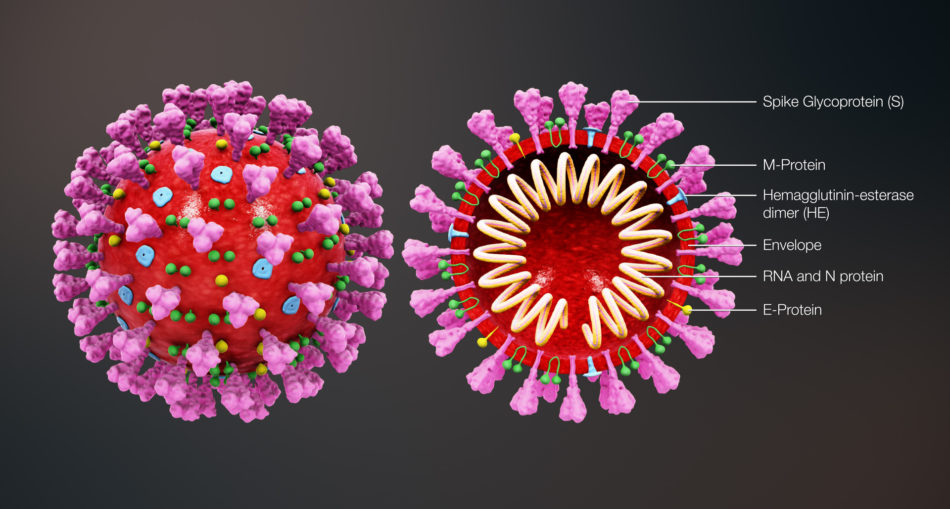The Coronavirus (COVID-19) is a relatively new virus recently discovered in 2019 in the city of Wuhan in China. It has been spreading from China since late 2019, moving from country to country. so far, over fifty (50) countries have been infected and over eighty thousand (80,000) persons. Guyana is the latest victim of the disease. The Coronavirus (COVID-19) arrived in Guyana, amid the complications of our 2020 General Elections. The Ministry of Health has confirmed Guyana’s first case of the Coronavirus in Ratna Baboolal of Good Hope, East Coast Demerara who recently returned from the United States of America, showed symptoms of the disease. As of 15th March, 2019 there has been four (4) confirmed Coronavirus (COVID-19) cases so far in Guyana, including Ratna Baboolal, her husband son and another relative all of whom are said to be in full quarantine.

WHO Advice – Image Source: https://www.who.int/images/default-source/health-topics/coronavirus/social-media-squares/be-smart-inform.tmb-479v.jpg?sfvrsn=f6dbe358_6
What is the Coronavirus (COVID-19)?
According to the World Health Organization (WHO) Coronavirus is a large group of viruses. They are made up of genetic material surrounded by spikes of protein, giving it the appearance of a crown, from which the virus has gotten its name. The various types of Coronavirus sometimes cause mild symptoms of respiratory diseases like the common cold to pneumonia and gastrointestinal diseases. COVID-19 is an infectious disease that can spread from person to person, involving your nose, throat, airways and lungs. However, there are some Coronaviruses which can cause severe respiratory disease. These are the Acute Respiratory Syndrome or SARS-CoV first identified in China in 2003 and the Middle East Respiratory Syndrome or MERS-CoV identified in Saudi Arabia in 2012. The Coronavirus or COVID-19 that is currently spreading throughout the world, has said to have recently arrived in Guyana. So far, a cure for this disease has not been found while it infects many more persons as more time passes by.
Interesting Tip
- The word Corona is Latin for ‘crown’ in reference to the crown-like shape of the virus.
The spreading of the Coronavirus (COVID-19)
Worldwide
This type of Coronavirus that is currently spreading worldwide is the 2019n-CoV or COVID-19. It was identified in the city of Wuhan, China in persons with symptoms of pneumonia who were associated in a nearby live seafood and animal market. This Coronavirus was potentially spread from the victims to family members and health care professionals like doctors and nurses. Coronaviruses can be transmitted between animal species and humans; they are zoonotic. However, there are some Coronaviruses in animals, which have not yet infected humans. The Coronavirus (COVID-19) has spread from China to countries all over the globe including India, China, United States of America, Brazil, Guyana, Iran, Jamaica, Russia, The Netherlands, Greece and the United Kingdom.
In Humans
The Coronavirus can spread from animals to humans, a process known as spillover. However, the animal origin of the Coronavirus (COVID-19) is not known as of date. Coronaviruses fall under the category of respiratory viruses which are spread by droplets that are created when an infected person sneezes or coughs. COVID-19 is also spread by close contact with an infected person and contact with contaminated surfaces. This is why is important to sneeze into your elbows and cover your mouth when you cough. Coronavirus (COVID-19) can be diagnosed by a test called Polymerase Chain Reaction (PCR). There is no evidence that suggests Coronavirus is spread by food or by eating chicken but ensure food is thoroughly cooked.
Interesting Tip
- Coronavirus can survive from eight to ten (8-10) hours over porous surfaces e.g. paper, untreated, wood,fabric, sponge and cardboard. However, it can survive longer on nonporous surfaces like plastic, glass, metal and varnished wood.
Who are at risk?
In children and younger adults, symptoms of Coronavirus are generally mild. Persons more at risk of contracting COVID-19 are older adults and those who have health conditions such as heart disease, diabetes, and lung disease. However, the mortality rate of COVID-19 is between two to three (2-3) percent, a lot less severe than SARS-CoV or MERS-CoV.
Symptoms of the Coronavirus (COVID-19)
If you have recently travelled to the United States of America, China, Iran, Italy, Republic of Korea, or have been in contact with a person who did, you may be suspected of having the COVID-19. Check for common signs of a Coronavirus infection which includes:
- breathing difficulties
- cough
- death
- fever
- kidney failure
- pneumonia
- severe acute respiratory syndrome
- shortness of breath
- respiratory symptoms
These symptoms may appear in two to fourteen days of exposure to COVID-19. If you have some of these symptoms, do not panic. Instead, you can:
- Inhale steam 2-3 times daily to clear congestion.
- Stay hydrated.
- Get enough rest.
- Wash your hands frequently to reduce spread the virus.
- Visit a doctor if your condition worsens.
- Take all medicine as directed by a doctor.
How to be safe in the Coronavirus (COVID-19) Outbreak
Standard hygiene recommendations have been made to prevent the contraction and spread of the Coronavirus. These include:
- Washing your hands regularly – Use soap and water or using alcohol-based hand rub to kill possible viruses that may be on your hands. Hand sanitizer can also be used in place of soap.
- Ensure meat and eggs are properly cooked – This may help to kill any bacteria from the animal.
- Do not touch your eyes, mouth or nose with unclean hands – This will avoid germs getting on to your face and into your system.
- Beware of anyone coughing and sneezing as these may be signs of a respiratory illness like the COVID-19 – Keep your distance from them. Droplets produced due to their sneezing or cough may contain the virus which can infect you if the droplets are breathed in.

Tips on Staying Safe – Image Source: https://www.who.int/images/default-source/health-topics/coronavirus/social-media-squares/blue-2.tmb-479v.png?sfvrsn=2bc43de1_1
How to Protect others from the COVID-19
- Cover your mouth and nose when sneezing and coughing – Ensure you do this and encourage others to do the same. Dispose of any such tissue right away.
- Do not travel or visit any crowded place if you are sick – This helps to contain the virus.
- Wearing disposable surgical masks – This will help to contain the virus if you are infected.
- Stay inside – If you have difficulty breathing, fever or cough do not leave your house. Call a healthcare professional and follow their advice.
- Be updated with new information and informed follow the advice given by your healthcare provider – This includes National and Local authorities, including the Ministry of Public Health.
List of Countries with confirmed cases of Coronavirus (COVID-19) as of 12th March, 2020 – According to Aljazeera News
- Afghanistan
- Albania
- Algeria
- Andorra
- Argentina
- Armenia
- Australia
- Austria
- Azerbaijan
- Bahrain
- Bangladesh
- Belarus
- Belgium
- Bhutan
- Bolivia
- Bosnia & Herzegovina
- Brazil
- Brunei
- Bulgaria
- Burkina Faso
- Cambodia
- Cameroon
- Canada
- Chile
- China
- Colombia
- Costa Rica
- Croatia
- Cuba
- Cyprus
- Czech Republic
- Democratic Republic of Congo
- Denmark
- Dominican Republic
- Ecuador
- Egypt
- Estonia
- Finland
- France
- French Guiana
- Georgia
- Germany
- Guyana
- Honduras
- Hungary
- Iceland
- India
- Indonesia
- Iran
- Iraq
- Ireland
- Israel
- Italy
- Ivory Coast
- Jamaica
- Japan
- Jordan
- Kuwait
- Latvia
- Lebanon
- Liechtenstein
- Lithuania
- Luxembourg
- Malaysia
- Maldives
- Malta
- Mexico
- Moldova
- Monaco
- Mongolia
- Morocco
- Nepal
- Netherlands
- New Zealand
- Nigeria
- North Macedonia
- Norway
- Oman
- Pakistan
- Palestine
- Panama
- Paraguay
- Peru
- Philippines
- Poland
- Portugal
- Qatar
- Romania
- Russia
- San Marino
- Saudi Arabia
- Senegal
- Serbia
- Singapore
- Slovakia
- Slovenia
- South Africa
- South Korea
- Spain
- Sri Lanka
- Sweden
- Switzerland
- Taiwan
- Thailand
- Togo
- Tunisia
- Turkey
- Ukraine
- United Arab Emirates
- United Kingdom
- United States
- Vatican City
Watch This! – Coronavirus – questions and answers (Q&A) | World Health Organization (WHO)
Interesting Tip
- For accurate information and updates on COVID-19 use trusted and reputable sites such as the World Health Organization (WHO) and Unicef.
- See link for WHO here: https://www.who.int/health-topics/coronavirus
- See link for Unicef here: https://www.unicef.org/coronavirus/covid-19
About Coronavirus (COVID-19)
The Coronavirus or COVID-19 is becoming a global epidemic with world leaders trying to prevent widespread panic among their people. The origin of the virus has not yet been confirmed as of 12th May, 2020. This leads to many conspiration theories taking up residence on the internet, thriving on those panicking, unaware and misinformed through countless of these fake articles. Some believe COVID-19 is an instrument of biological warfare, engineered to control the world’s population. In Guyana’s already tense atmosphere due to General Elections 2020, the news of Coronavirus or COVID-19 is may create an even tenser feeling. The population will no doubt become twice as anxious, for news of elections as well as the recent outbreak of COVID-19 in Guyana and around the world, especially when no cure has been made and persons are dying every day.
Download the Corona No-Panic Help Guide:
What do you think about the COVID-19? Was it a man-man weapon created for World War III, as part of the biowarfare artillery? Tell us what you think in the comments below.
Article Reference
- https://www.kaieteurnewsonline.com/2020/03/15/guyanas-coronavirus-toll-jumps-to-four/
- https://www.who.int/health-topics/coronavirus
- https://www.who.int/emergencies/diseases/novel-coronavirus-2019/advice-for-public
- https://www.unicef.org/coronavirus/covid-19
- https://youtu.be/mOV1aBVYKGA
- https://www.kaieteurnewsonline.com/2020/03/12/guyana-records-first-coronavirus-case-victim-died-yesterday-after-arriving-last-saturday-from-ny/
- https://www.cdc.gov/coronavirus/2019-ncov/specific-groups/high-risk-complications.html
- https://www.aljazeera.com/news/2020/01/countries-confirmed-cases-coronavirus-200125070959786.html
Last updated: 2020-03-15.








1 Comment